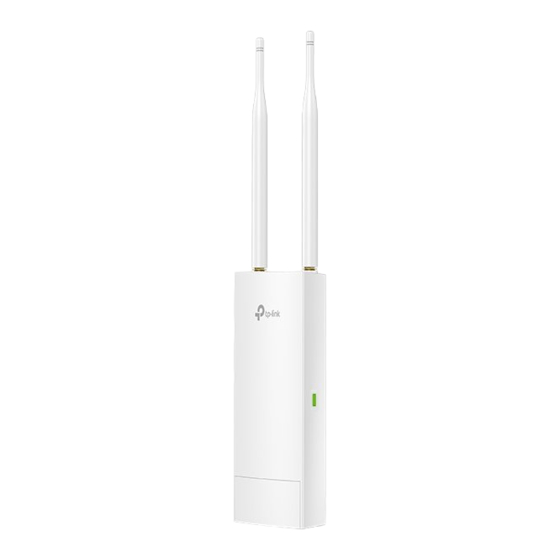
TP-Link AURANET EAP110-Outdoor Installation Manual
300mbps wireless n outdoor access point
Hide thumbs
Also See for AURANET EAP110-Outdoor:
- User manual (104 pages) ,
- Installation manual (76 pages) ,
- Quick setup manual (10 pages)
Table of Contents
Advertisement
Advertisement
Table of Contents

Summary of Contents for TP-Link AURANET EAP110-Outdoor
-
Page 1: Installation Guide
EAP110-Outdoor Installation Guide 300Mbps Wireless N Outdoor Access Point... -
Page 3: Table Of Contents
Contents Overview Typical Network Topology Lightning and ESD Protection Hardware Installation Mount EAP Connect Cables Power On Software Configuration... -
Page 4: Overview
Overview Package Contents Mounting Bracket M3×28 Plastic Wall Anchors(Qty.3) Antennas (Qty.2) M3×20 Self-tapping Screws (Qty.3) EAP110-Outdoor Installation Guide 300Mbps Wireless N Outdoor Access Point Installation Guide Metal Strap Passive PoE Adapter Power Cord Waterproof Rubber Insert... -
Page 5: Panel Layout
Panel Layout The Panel of EAP Grounding RESET Shielded Ethernet Terminal Port LAN... - Page 6 SYS LED Explanation LED Status Indication Flashes green, red The device is initializing. and yellow before remaining green Flashes green twice Initialization is completed. Solid green The device is working properly . Flashes red System errors. RAM, Flash, Ethernet, WLAN or firmware may be malfunctioning.
-
Page 7: Typical Network Topology
Typical Network Topology Internet Router Switch EAP Controller Manangement Host Clients A DHCP server (typically a router) is required to assign IP addresses to the EAPs and clients in your local network. The management host can be in the same or different network segment with the EAPs. -
Page 8: Lightning And Esd Protection
Lightning and ESD Protection Before mounting EAP, you should consider Lightning and ESD Protection to ensure safety. Proper grounding is extremely important for outdoor devices. There are two effective techniques for grounding the outdoor EAP: Option A Use a shielded CAT5e (or above) cable with an integrated grounding wire for connection. -
Page 9: Hardware Installation
Grounding Terminal Grounding Wire Shielded CAT5e (or above) Grounded 3-wire Cable with an Integrated Power Outlet Grounding Wire Grounding Cable Grounded PoE Adapter Earth Ground Hardware Installation Mount EAP The EAP can be pole-mounted or wall-mounted. - Page 10 Option 1: Pole Mounting Step 1: Loosen and completely remove the end of the metal strap by turning the captive screw counterclockwise with a flathead screwdriver. Step 2: Lead the end of the metal strap through the back of the EAP. Step 3: Position the EAP and wrap the metal strap around the pole.
- Page 11 Option 2: Wall Mounting Step 1: Place the mounting bracket in the position you require. Mark three positions for the screw holes . Drill three 6mm (in diameter) holes at the marked positions. Step 2: Insert the plastic wall anchors into the 6mm holes.
-
Page 12: Connect Cables
Connect Cables Step 1: Firmly grasp the rear of the interface cover and pull it downward. Step 2: Use an adequate Ethernet cable to connect the LAN port. The length of cable is up to 60m for steady power supply. Shielded CAT5e (or above) cable with an integrated ground wire is recommended. -
Page 13: Power On
Power On Connect the EAP to a Power over Ethernet (PoE) adapter as follows: Ethernet cable length up to 60m Step 1: Connect the Ethernet cable from the EAP to the POE port of the PoE adapter. Step 2: Connect the power cord to the power port on the PoE adapter and plug it into an electrical outlet. -
Page 14: Software Configuration
Step 1: Installing the EAP Controller On the management host, download the EAP Controller installation file from the product support page at www.tp-link.com. Run the file and follow the wizard to install the EAP Controller. Step 2: Configuring the EAP Controller Launch the EAP Controller and follow the configuration wizard to create a primary wireless network. - Page 16 © 2017 TP-Link 7106507111 For technical support and other information, please visit: REV1.0.1 http://www.tp-link.com/support...













Need help?
Do you have a question about the AURANET EAP110-Outdoor and is the answer not in the manual?
Questions and answers
Having extreme difficulty getting initial setup on Auranet EAP110 Outdoor device. Need instructions for dummies. Device gives open internet, but impossible to find way to login and setup admin and password.
To set up the TP-Link Auranet EAP110-Outdoor device for the first time, follow these steps:
1. Unpack the Device
Ensure you have all the package contents, including the EAP110-Outdoor device, mounting bracket, antennas, screws, metal strap, passive PoE adapter, power cord, and waterproof rubber insert.
2. Mount the EAP110-Outdoor
- Attach the mounting bracket to a wall or pole using the included screws or metal strap.
- Secure the device onto the mounting bracket.
3. Connect the Cables
- Attach the provided antennas to the device.
- Connect an Ethernet cable from the LAN port of the EAP110-Outdoor to the PoE adapter’s PoE port.
- Connect another Ethernet cable from the PoE adapter’s LAN port to a router or switch.
4. Power On the Device
- Plug the power cord into the passive PoE adapter and connect it to a power source.
- The device will initialize, indicated by the LED flashing green, red, and yellow before turning solid green.
5. Software Configuration
- Connect a computer or mobile device to the EAP110-Outdoor’s wireless network.
- Access the configuration interface via a web browser.
- Follow the setup instructions to configure the network settings.
Once these steps are completed, the device will be ready for use.
This answer is automatically generated